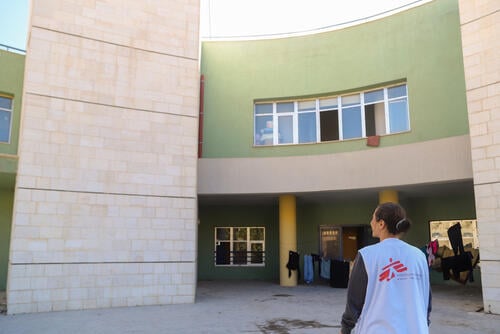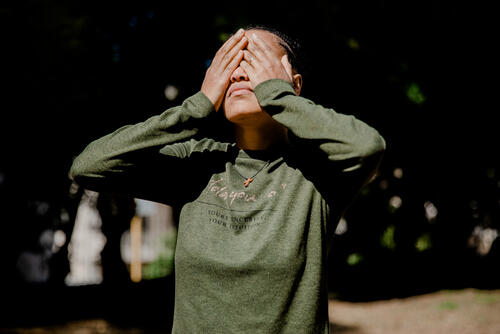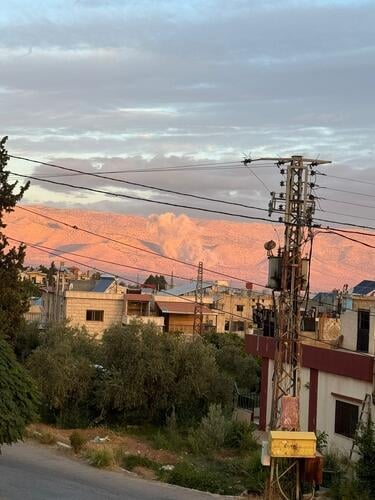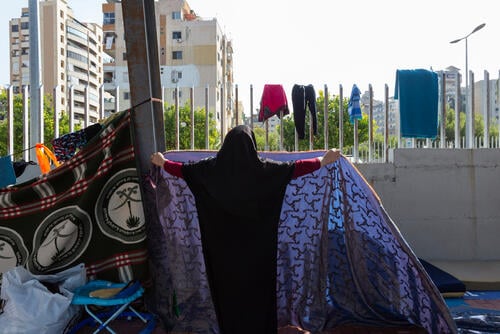“At first, I started crying out and praying to God, thinking our son Ali, who lives with us along with his wife and five children, was injured,” Sekna Fakih says, tears in her eyes. “I thought the strike had hit us and that he was hurt because I heard him yelling.” Later she learned Ali was calling them to get into the car and flee.
At 85 years old, Sekna remembers the moment she had to flee her home in Aita Al Jabal, a village in southern Lebanon. She had received the so-called evacuation orders from the Israeli forces. These sometimes come just 15 minutes before attacks begin, meaning entire families are forced to leave their houses with no certainty of how to reach safety.
It was the beginning of the war's intensification, as Israeli bombing and shelling escalated across Lebanon in September 2024. As windows shattered and rubble fell, people had no choice but to abandon everything they knew. Sekna left with her husband, who struggles with mobility from multiple health issues. Together, they embarked on a harrowing 14-hour journey north to Akkar—a trip that normally takes just four hours. But there were so many other people on the road fleeing north in search of safety.
Since the onset of cross-border attacks between Hezbollah and Israel on 8 October 2023, Israeli airstrikes have intensified, spreading across the country into densely populated areas, killing over 3,500 people and injuring 15,000 more. The majority of these attacks have occurred in recent weeks.1
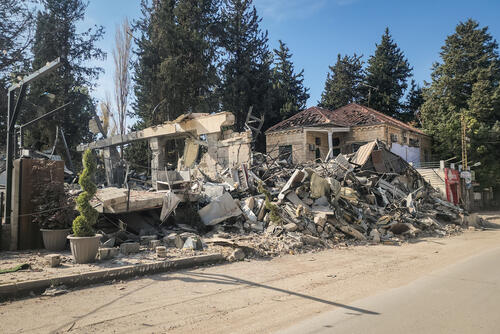
The conflict has also displaced more than 896,000 people, mainly from southern Lebanon, southern Beirut, and Baalbek- Hermel governorate, according to the International Organization for Migration.2
Dire living conditions
Most displaced people have moved to other governorates, with 66 per cent seeking refuge in areas like Mount Lebanon, located in the central part of the country, Akkar in the north, and northern Beirut.3
Some people have been able to stay with friends or family, others have rented houses. But many have been forced into overcrowded shelters already at capacity that often lack basic services like clean water, heating, and sanitation.
“I am lucky to stay in a house, but many are in shelters, like my daughters and their families who are scattered across the country,” Sekna says. “It was only thanks to my brother-in-law’s son, who is helping us pay for this rented house, that we were able to find shelter.”
She says he wanted to help his uncle knowing his medical conditions would make it difficult to stay in a shelter. Despite the roof over her head, Sekna struggles with the cold like so many others.
“We can’t afford heating; we just pile on blankets,” she says.
Overwhelming needs, attacks on medical facilities
As winter approaches, the lack of preparation in many overcrowded shelters leaves people vulnerable to preventable diseases. The 22 Médecins Sans Frontières (MSF) mobile medical teams currently spread across the country are already seeing cases of skin infections and respiratory illnesses, particularly among children and older adults.
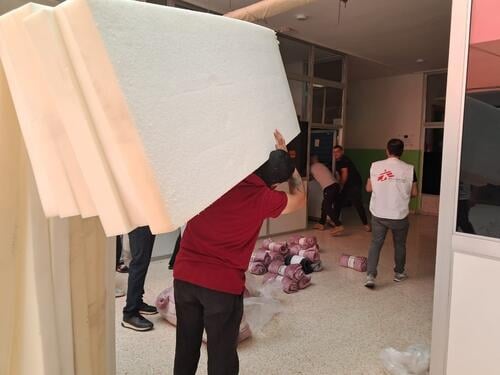
“Without access to clean water, proper sanitation, and heating, people’s health is further threatened,” says Itta Helland-Hansen, deputy emergency coordinator with MSF in Lebanon. “Lebanon’s healthcare system is already overstretched, and this only adds pressure.”
Heavy Israeli airstrikes have also made it even harder for people to access medical care and impeded its delivery. Since mid-September 2024, WHO’s Surveillance System for Attacks on Healthcare has documented 137 attacks on healthcare facilities, with 226 health workers killed and 199 injured while on duty since 8 October 2023.4
Sekna is deeply worried about her son-in-law, who volunteers with the Lebanese Red Cross.
“May God protect him,” she says. “He refused to leave. He insisted on staying for his duty, but I worry for him every day. Just a few weeks ago, a hospital near him in Tebnine, south of Lebanon, was hit. I can’t stop thinking about him.”
He insisted on staying for his duty, but I worry for him every day. Just a few weeks ago, a hospital near him in Tebnine, south of Lebanon, was hit.Sekna, an 85-year-old woman displaced by the conflict
Due to the violence, road damage, and security risks, MSF is unable to reach people in some affected areas. MSF has been forced to close our clinic in the Burj el Barajneh Palestinian camp in Beirut’s southern suburbs and temporarily suspend activities in Baalbek-Hermel, relocating medical supplies from the northeast. Vulnerable people in these areas, particularly those who used to get treatment at our clinic now find it more challenging to reach essential care.
Economic collapse, healthcare strain, and war
The toll of the ongoing conflict is compounded by years of hardship. Lebanon has endured one of the worst economic crises in the world, which began around 2019 and has left more than 80 per cent of people living in poverty. The country’s financial collapse has wiped out savings, caused widespread unemployment, and the cost of living has skyrocketed.
People in Lebanon have been pushed to their limits. Some people have received solidarity from relatives and their community, others have been able to rely on their savings. But even this is not sustainable and will eventually be depleted. Others, particularly Palestinian and Syrian refugees, migrant workers, and those displaced outside of the established shelters without basic services or support, are in even worse situations. Their already vulnerable conditions are exacerbated by constant fear for their lives.
The humanitarian situation in Lebanon is already dire and expected to be prolonged. It could worsen if urgent action is not taken.Itta Helland-Hansen, deputy emergency coordinator with MSF in Lebanon
“International actors need to step up their efforts to stop the violence and prevent further suffering and loss of life in the region,” says Helland-Hansen. “The humanitarian situation in Lebanon is already dire and expected to be prolonged. It could worsen if urgent action is not taken. People who are holding on will reach their breaking point – things are not sustainable, and the humanitarian situation will get worse. For those who are already vulnerable, we will only see more threats to their health and more lives lost.”
Sekna reflects on the life she built with her husband, Abu Ali, and the memories they created together.
“Even if it was humble, with a few olive trees, it was my life and my memories,” she says.
The south of Lebanon, where Sekna and Abu Ali come from, is known for its rich olive groves, producing some of the best olive oil in the country. The olive harvest, a labour-intensive process passed down through generations, provides many families with their main source of income.
The economic collapse had already filled Sekna’s life and others in Lebanon with uncertainty. Everything she built with her husband was taken away. But now, with this new war, that sense of uncertainty has deepened into a profound loss. The memories she cherished seem to be slipping away in the chaos of displacement and destruction. For people like Sekna, who have lived through Lebanon’s many crises, it feels as though the war has wiped away not just their homes but their sense of being and purpose.
“This man you see here, he was the most handsome guy in the town,” says Sekna. “He used to work in the hospital, and they used to think he was its director because of how elegant he was.” Her voice softens, and she sighs, seeming to long for the past. “Oh, love of my life, who could have imagined what the world had in store for us?”
MSF's response to the humanitarian crisis in Lebanon
In response to the ongoing escalation of conflict and intense Israeli bombing in Lebanon, MSF has sent 22 mobile medical teams across various regions of the country. These teams are providing psychological first aid, general medical consultations, medications, and mental health support. MSF is also distributing essential items such as blankets, mattresses, and hygiene kits, as well as supplying water by trucks to schools and shelters where displaced people have gathered. Additionally, we are offering hot meals and drinking water to hundreds of displaced families.
MSF has also donated fuel and trauma kits to several hospitals, prepositioned 1,922 kilograms of medical supplies, and trained over 400 healthcare workers in trauma care and mass casualty management across the country. As of 11 November 2024, our medical teams have also started to provide direct hands-on support to the Baabda hospital, Beirut governorate, in its emergency room and one operating theatre, and to the Turkish hospital, South governorate, in its operating theatre, emergency room, and inpatient department.
MSF is an independent international medical humanitarian organisation that provides aid and free healthcare to people in need, without discrimination. MSF first began to work in Lebanon in 1976, and our teams have worked in the country without interruption since 2008.



